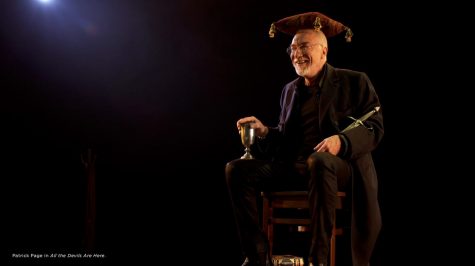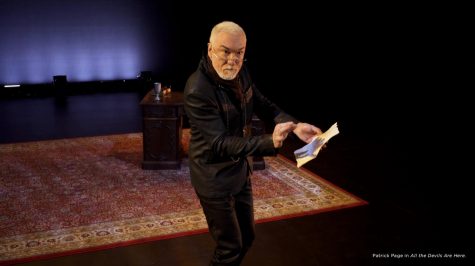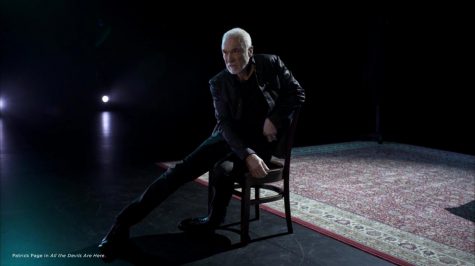Empty seats, but the show must go on: “All the Devils are Here” in review
March 25, 2021
A man steps out onto a dark stage, facing a theatre full of empty seats. He crouches over a book, lifts a staff and strikes the stage three times. The lights shift, highlighting the actor in a striking glow. He begins to speak: “Come, you spirits who tend on mortal thoughts; unsex me here, and fill me from the crown to the toe top-full of direst cruelty.”

This is Patrick Page, a 1985 Whitman alum and award-winning Broadway actor. The words are Lady Macbeth’s, but this is not “Macbeth”: this is the opening of “All the Devils are Here: How Shakespeare Invented the Villain,” written and performed by Page and directed by Alan Paul.
“All the Devils are Here,” produced by the D.C.-based Shakespeare Theater Company, was filmed in the empty Sidney Harman Hall theatre in Washington, D.C., following strict precautions to ensure the safety of both performers and crew. There was no audience in the seats; instead, the performance is available to view online until July 28 for the cost of $25.
It is a one-man show, but that does not mean that it lacks characters: throughout the show, Page steps in and out of various villainous characters, twisting and weaving a wide variety of Shakespearean monologues, as well as Page’s own experiences, historical knowledge and analysis into one 80-minute performance. It is a captivating performance, but it is also partially just an absolutely fascinating lecture.

Over the course of the show, Page moves through Shakespeare’s villains chronologically, also touching on some of Shakespeare’s influences, including the morality plays he may have seen as a child and the works of his rival Marlowe. In doing so, Page demonstrates Shakespeare’s growth from stereotypical “bad guys” of his time — who were often representative of groups that were prejudiced against at the time and were simply “bad” — to villains with more depth, motivation and humanity.
Given the prejudices of the time, some of the villains that Page portrays towards the beginning of the show are written as stereotypes—he even explains that originally, the word villain simply meant someone of “low birth.”
Page notes in his opening that he will be portraying characters of abilities, races, ethnicities and genders not his own, and he gives a trigger warning before one particular section in which he showcases two horribly offensive anti-Semitic monologues written by Shakespeare and one of his contemporaries. This section was uncomfortable to watch, and that was the point; Page is discussing the prejudices of the time and how they appeared in the theatre. Although difficult to watch, it is important to learn about, and Page’s careful discussion afterward demonstrates the actor’s own understanding and views towards the subject.

Page shifts between each villain with nuance and depth, proving both his range and Shakespearean knowledge. Like a sunset fading into night, Page shifts so effortlessly between characters, sometimes even playing two characters in one scene, that he makes it look easy, though any actor will tell you that it isn’t.
Though Page is the only person we see on stage, there were plenty of others behind the scenes. The lighting and sound cues were both extremely well done, adding to the impact of Page’s performance without distracting. The camera shots offered a cinematic experience, but not so cinematic that the element of theatricality was lost, although the shots of the empty theatre served as a constant reminder of the reason why the performance is only available to watch online.
Overall, the performance was enjoyable and captivating, although perhaps slightly more so for those who enjoy Shakespeare and not those looking for a light, cohesive story. Page’s acting demonstrated deep nuance and understanding, and the more sensitive topics were handled with great care and consideration. One can only imagine watching the show live, but even with the restrictions of having to stream it, not all of the magic of theatre was lost.
As the show draws to a close, Page once again holds the book and the staff, this time as Prospero of The Tempest. He strikes the stage three times, as at the beginning, and after a moment of speech, rises again and cracks the staff over his knee. Finally, he turns around, and with the empty theatre framed behind him, speaks his final words: “We are such stuff as dreams are made on, and our little life is rounded with a sleep.”
“All the Devils are Here: How Shakespeare Invented the Villain” is available to stream online at https://www.shakespearetheatre.org until July 28.





